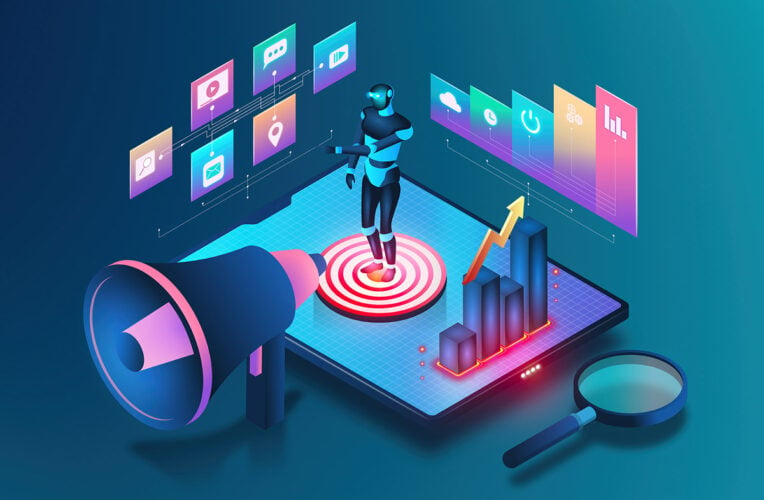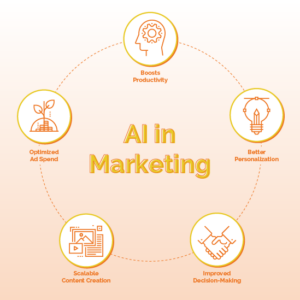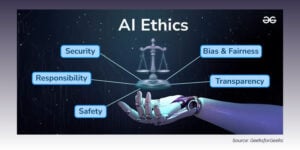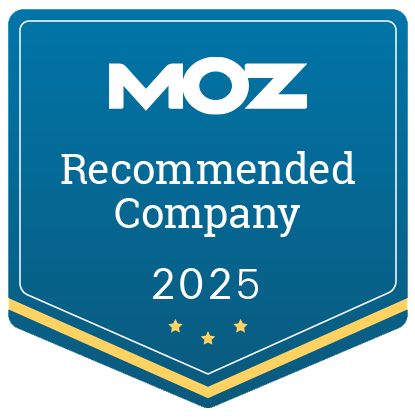Artificial intelligence isn’t just a futuristic buzzword anymore—it’s reshaping the marketing world as we know it. From personalized content and automated emails to media buying and in-depth customer analysis, AI has stepped into nearly every corner of digital marketing.
And in 2025, the transformation is nothing short of incredible.
If you’re a digital marketer, content strategist, or business owner trying to stay relevant, understanding the impact of AI on digital marketing is no longer optional—it’s essential. This guide looks into real use cases, practical applications, and the most exciting tools changing the game.
What Is Artificial Intelligence?
Artificial intelligence, at its core, is the ability of machines to simulate human intelligence by learning from data, identifying patterns, making decisions, and improving over time. In marketing, AI isn't just crunching numbers behind the scenes. It’s powering the content we read, the emails we open, the ads we see, and even the customer service chats we engage with.
So whether you're tweaking SEO strategies, managing campaigns, or sending email sequences, there's a good chance AI is already part of your workflow—even if you don't realize it yet.
How Has AI Changed in The Past Year?
A lot can change in twelve months, especially in tech. Over the past year, AI in digital marketing has grown smarter, faster, and more nuanced.
Generative AI in marketing means a stronger emphasis by utilizing tools like ChatGPT, Perplexity, and Jasper to reduce friction between idea and execution. AI-driven SEO tools now do much of the heavy lifting from building content outlines, clustering search intent, and even optimizing for Google's search formats like AIO (AI Overviews). On top of that, Answer Engine Optimization (AEO) is becoming a staple for marketers looking to rank in AI-driven search responses.
More businesses are leaning into automation, real-time analytics, and AI-powered personalization, shifting from one-size-fits-all to highly tailored user experiences.
How Are Companies Using AI in Digital Marketing?
Let’s take a closer look at where artificial intelligence in digital marketing is making the biggest waves right now.
🤖 Conversational AI & Chatbots
Gone are the days of clunky chatbots that leave users frustrated. Conversational AI in marketing is all about real-time, context-aware responses. Platforms like Drift and Intercom allow brands to engage users in fluid, natural conversations—answering questions, qualifying leads, and nudging users toward conversion without missing a beat.
ManyChat integrates seamlessly with social platforms, helping brands maintain 24/7 communication without overextending their support teams.
📄 Content Generation & Optimization
If content is king, then AI in content creation is the power behind the throne. Marketers are using tools like Jasper and Copy.ai not just to generate blog posts but to brainstorm ideas, write social posts, generate video scripts, and more.
Paired with platforms like SurferSEO, content is optimized for keywords, tone, and user intent, all without losing its human touch. The result? Scalable content that still sounds authentic.
🧠 Predictive Analytics & Personalization
Thanks to predictive analytics in marketing, brands can now anticipate what their customers want (sometimes before the customers even know themselves). AI tools analyze browsing behavior, past purchases, and engagement trends to recommend personalized content, products, and offers.
From abandoned cart follow-ups to dynamic landing pages, predictive models help brands create seamless, one-to-one experiences at scale.
📸 Image & Video Generation
AI-generated visuals are also entering the mainstream with tools like DALL·E and Runway ML allowing marketers to create visuals without a designer and even produce product videos with zero camera time.
These innovations are cost-effective and enable rapid testing of creative assets—ideal for social campaigns or ad variations.
💵 AI in Ad Targeting and Media Buying
When it comes to ad spending, AI marketing strategies and tools are helping marketers get more bang for their buck. Advertising platforms like Meta’s Advantage+ and Google’s Performance Max optimize ad delivery in real time by analyzing user data, engagement trends, and bidding environments.
These tools remove much of the guesswork, automatically adjusting campaigns to focus on the highest-value audiences by boosting paid ads ROI while saving precious time.
📱 Social Media Management Tools
Social media marketing is another area where AI is brightly shining. Sprout Social and Lately AI are helping brands schedule content, analyze performance, and even generate optimized captions based on trending topics.
These tools help social teams stay nimble, spot opportunities faster, and stay consistent with posting, all while maintaining the brand tone.
📨 Email and Marketing Automation
Email may be one of the oldest digital marketing tools, but AI for email marketing is breathing new life into it. AI-driven email marketing platforms like Klaviyo and Mailchimp now offer predictive send times, personalized product recommendations, and dynamic subject lines that optimize for open and click-through rates.
Adding an ability to automate behavior-based triggers and segmenting with precision, marketers are sending smarter, more effective emails.
🔍 Customer Insights and Market Research
Marketers are also turning to AI-powered marketing automation to gather deep, real-time customer insights. Platforms like Crayon and Brandwatch track online conversations, reviews, and competitor updates to help marketers stay ahead of industry shifts and customer sentiment.
Benefits of Using AI in Digital Marketing
The benefits of AI in digital marketing are wide-ranging, but here’s what stands out most for businesses:
- AI significantly boosts productivity by automating repetitive tasks
- It allows for better personalization, driving engagement and customer satisfaction
- Get improved decision-making through predictive analytics and real-time data
- Makes content creation more scalable without sacrificing quality
- Optimize ad spend and improves campaign ROI
Drawbacks and Ethical Considerations of Using AI
Of course, AI isn’t without its pain points. One of the biggest concerns marketers face is maintaining their brand voice. With so much automation, there’s a risk of sounding generic or robotic.
There are also concerns about data privacy, especially with AI tools handling user behavior and predictive analytics. Marketers must ensure they comply with GDPR, CCPA, and other data regulations.
Then, there’s the issue of algorithmic bias. AI learns from the data it’s trained on—if that data is biased or incomplete, the output can reflect that. The ethical use of AI requires constant vigilance, thoughtful oversight, and transparency.
How to Use AI Strategically (and Responsibly)
Adopting AI successfully doesn’t mean going all-in, all at once. Smart marketers treat AI as a collaborator, not a crutch.
- Identify where automation brings the most value—like content drafting or email triggers.
- Always review and edit AI-generated outputs to maintain tone and consistency.
- Integrate AI tools that work with your existing stack.
- Train your team on AI best practices. human oversight is still key, especially in customer-facing content.
Curious how we use AI? Learn how our team utilizes AI tools to streamline our services.
Future Trends in AI and Digital Marketing
Looking ahead, the future of AI in digital marketing will be about convergence. Expect to see AI integrated more deeply with other emerging technologies.
AI will combine with AR and VR to create immersive brand experiences. Voice assistants will become shopping hubs, pushing Answer Engine Optimization (AEO) to the forefront. We’ll also see more AI integration with IoT devices, allowing for real-time, location-based offers and insights.
On the data side, blockchain and AI may merge to improve transparency in advertising and data tracking.
Frequently Asked Questions
Will AI replace marketers?
Not likely. But marketers who embrace AI will replace those who don’t.
How can I use AI without losing my brand voice?
Always review, revise, and guide your AI. It’s a co-creator, not the final editor.
Is AI-generated content penalized by Google?
No, as long as it’s useful and relevant. Check out ZGM’s AI and SEO Services to learn how to do it right.
What are the best AI tools for digital marketers?
Think Jasper, ChatGPT, SurferSEO, HubSpot AI, Mailchimp, Canva AI, and Drift.
AI as a Partner, Not a Replacement
At the end of the day, AI isn’t here to steal our jobs—it’s here to supercharge them. The key is to treat AI as a partner in your digital marketing strategy. Use it to automate the mundane, scale your content, personalize your outreach, and optimize performance.
The human element? That still matters most.
If you’re ready to focus on the true power of AI in your marketing, Zero Gravity Marketing is here to help. Reach out to our team of expert digital marketers. From AI content strategy to automation and SEO, we’ll make sure your AI efforts are as smart as the tools you're using!
About the Author













